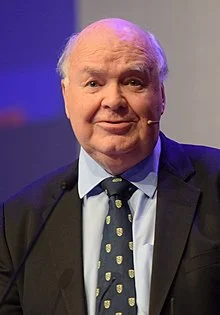
Dr. John Lennox
Dr. John Lennox is a renowned mathematician, philosopher of science, and Christian apologist. Born on November 7, 1943, in Northern Ireland, he has been a prominent figure in academic and religious circles. Lennox earned his PhD from Cambridge University and went on to teach Mathematics at the University of Oxford, where he also engaged in the study of the history and philosophy of science. Lennox is widely recognized for his efforts in defending the Christian faith, particularly in the context of scientific and ethical debates. His work often focuses on the relationship between science and religion, arguing against the notion that they are inherently in conflict. He has authored several books, including "God's Undertaker: Has Science Buried God?" and "Seven Days That Divide the World," which explore these themes in depth. A respected speaker and debater, Lennox has engaged with several prominent atheists, including Richard Dawkins and Christopher Hitchens, in public debates, bringing a unique blend of scientific insight and theological understanding to complex topics. His contributions extend to the broader public through numerous lectures, articles, and media appearances, where he addresses issues related to science, religion, ethics, and philosophy.
Books Mentioned on The Jordan B Peterson Podcast #394 - Dr. John Lennox
A Conversation About God with Dr. John Lennox on the Jordan B. Peterson Podcast #394
In episode #394 of the Jordan B. Peterson Podcast, Dr. Peterson engages in a profound dialogue with Dr. John Lennox, a mathematician, professor, author, and public intellectual. The conversation delves into the intricacies of the relationship between science and religion, exploring themes like transhumanism, ethical faith, reason, and the empirical world.
Science and Christianity: Bridging the Gap
Peterson opens the discussion by reflecting on his earlier belief in the irreconcilable divide between science and Christianity. He acknowledges how his views have evolved, recognizing the closer connection between the two realms. This change in perspective, partly influenced by Carl Jung’s writings, sheds light on the origins of science within the monastic tradition and the Christian doctrine of creation.
The Foundation of Modern Science in Biblical Worldview
Lennox highlights how the biblical worldview laid the groundwork for the emergence of modern science. He cites historical figures like Galileo and Newton, who were believers in God, and argues that science and the biblical worldview are comfortably aligned. Lennox challenges the common narrative that science and atheism are compatible, stirring a provocative discussion on the fundamental intellectual disciplines rooted in biblical teachings.
The Interplay of Greek and Judeo-Christian Thought
The conversation shifts to the intersection of Greek and Judeo-Christian thought. Peterson and Lennox discuss the Greek concept of logos and its compatibility with the Judeo-Christian idea of the word incarnate. They explore the notion of the cosmos as a comprehensible and moral universe, reflecting on the implications of this understanding for human beings and their relationship with the divine.
The Human Quest for Truth and Understanding
A significant part of the dialogue revolves around the pursuit of truth, both in science and in religion. They touch upon the ethical dimensions of scientific inquiry and the importance of maintaining moral and ethical standards in the quest for knowledge. This leads to a discussion on the concept of revelation, both in a human and divine context, and the role it plays in our understanding of the universe and our existence within it.
The Dangers of Transhumanism and the Loss of Transcendence
The podcast takes a critical view of transhumanism, discussing its potential dangers and the ethical dilemmas it presents. Lennox warns against the hubris of attempting to redefine human nature through technological means, emphasizing the importance of acknowledging a higher, divine order.
The Role of Sacrifice in Human Experience
In a poignant part of the conversation, Peterson and Lennox delve into the concept of sacrifice in both human and divine contexts. They discuss the transformative power of embracing mortality and the hope offered by the Christian narrative of resurrection. This leads to an exploration of the moral and ethical frameworks that guide human actions and decisions.
Conclusion: Seeking Light in a Complex World
The podcast concludes with reflections on the necessity of seeking light and truth in a complex world. The discussion between Peterson and Lennox provides a rich exploration of the interplay between science, religion, faith, and reason, offering profound insights into the human condition and our quest for understanding.
